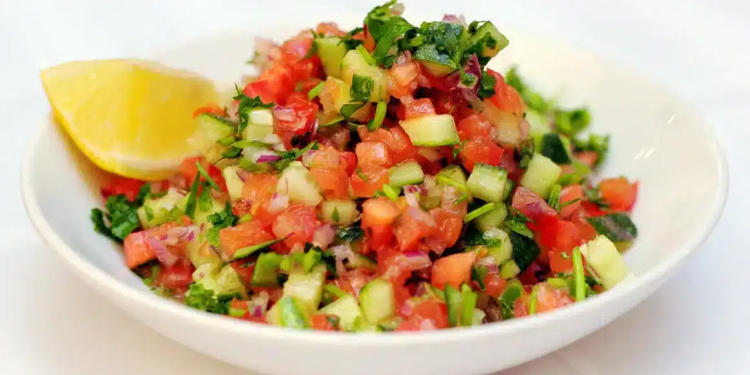Missiles above Tehran, silence in Gaza, tension in Washington… and tomatoes in Tel Aviv. This June 18, while the headlines announce a possible American military intervention after the Israeli strikes on Iran, CNN publishes, just below its “Breaking News” sectiona fresh, crunchy, and well-seasoned item: “The 24 best salads in the world”.
And at the heart of the top 5 of this global list, between a Tuscan panzanella and a Thai salad: the famous “Israeli salad”. Or should we say… our Tunisian salad, simplified version, without tuna or egg.
A renamed salad, a confiscated memory
Tomatoes. Cucumbers. Parsley. Lemon juice. Olive oil. Salt. Nothing more, nothing less. A recipe older than the borders, known by a thousand names throughout the Arab world — salata baladi in Egypt, méchouia salad in Tunisia, Arabic salad in Palestine. At home, we simply call it “slata”.
But in the world of CNN, this salad becomes “Israeli”. Even stronger: Michael Solomonov, the Israeli-American leader cited in the article, unabashedly recognizes his “Arab origins”. And yet, CNN classifies salad under the blue and white banner. The confession is there. Rebranding, too.
Special mention to everyone… except us
In this ranking, Lebanon is cited for its tabbouleh, Iran for its Shirazi salad. The latter is even compared to Israeli salad — which amounts to saying that the original resembles its own copy. We border on caricature.
But Tunisia is conspicuous by its absence, despite the richness of its salads: méchouia, houria, slata tounsia… Nothing, not even a footnote. However, we are at the heart of this shared culinary tradition, where tomatoes and cucumbers are eaten raw, cooked, crushed, smoked, marinated. But clearly, the taste for origins stops where the geography of power begins.
Soft power on the plate: the culture war continues
This is not a simple salad. It’s a strategy. That of erasure, of makeup, of renaming. Falafel, hummus, keffiyeh — all have become Israeli “export products” in the eyes of a certain Western storytelling.
And now, the salad.
Publishing this article at the very moment when Israel is bombing Iran and the United States is threatening war is no coincidence. This is a form of strategic dissonance. As the bombs fall, the cucumbers tell a different story. Softer. More digestible.








